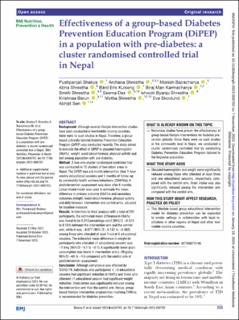Effectiveness of a group-based Diabetes Prevention Education Program (DiPEP) in a population with pre-diabetes: a cluster randomised controlled trial in Nepal
Shakya, Pushpanjali; Shrestha, Archana; Bajracharya, Monish; Shrestha, Abha; Kulseng, Bård Eirik; Karmacharya, Biraj Man; Shrestha, Smriti; Das, Seema; Shrestha, Ishwori Byanju; Barun, Krishnaa; Shrestha, Nistha; Skovlund, Eva; Sen, Abhijit
Journal article, Peer reviewed
Published version
Permanent lenke
https://hdl.handle.net/11250/3121868Utgivelsesdato
2023Metadata
Vis full innførselSamlinger
Sammendrag
Background Although several lifestyle intervention studies have been conducted in low/middle-income countries, there were no such studies in Nepal. Therefore, a group-based culturally tailored Diabetes Prevention Education Program (DiPEP) was conducted recently. The study aimed to evaluate the effect of DiPEP in glycated haemoglobin (HbA1c), weight, waist circumference, physical activity and diet among population with pre-diabetes. Method A two-arm cluster randomised controlled trial was conducted in 12 clusters of two urban areas in Nepal. The DiPEP was a 6 month intervention (four 1-hour weekly educational sessions and 5 months of follow-up by community health workers/volunteers (CHW/Vs)). A postintervention assessment was done after 6 months. Linear mixed model was used to estimate the mean difference in primary outcome (HbA1c) and secondary outcomes (weight, waist circumference, physical activity and diet) between intervention and control arms, adjusted for baseline measure. Results In intention-to-treat analysis with a total of 291 participants, the estimated mean difference in HbA1c was found to be 0.015 percentage point (95% CI −0.074 to 0.104) between the intervention arm and the control arm, while it was −0.077 (95% CI −0.152 to −0.002) among those who attended at least 3 out of 4 educational sessions. The estimated mean difference in weight (in participants who attended ≥1 educational session) was −1.6 kg (95% CI −3.1 to −0.1). A significantly lower grain consumption was found in intervention arm (−39 g/day, 95% CI −65 to −14) compared with the control arm at postintervention assessment. Conclusion Although compliance was affected by COVID-19, individuals who participated in ≥3 educational sessions had significant reduction in HbA1c and those who attended ≥1 educational session had significant weight reduction. Grain intake was significantly reduced among the intervention arm than the control arm. Hence, group-based lifestyle intervention programmes involving CHW/vs is recommended for diabetes prevention Effectiveness of a group-based Diabetes Prevention Education Program (DiPEP) in a population with pre-diabetes: a cluster randomised controlled trial in Nepal
Utgiver
BMJTidsskrift
BMJ Nutrition, Prevention and Health
Med mindre annet er angitt, så er denne innførselen lisensiert som Navngivelse-Ikkekommersiell 4.0 Internasjonal
Beslektede innførsler
Viser innførsler beslektet ved tittel, forfatter og emneord.
-
Validation of the Nepali versions of the Neck Disability Index and the Numerical Rating Scale for Neck Pain
Shrestha, Dipak; Shrestha, Rohit; Grotle, Margreth; Nygaard, Øystein Petter; Solberg, Tore (Peer reviewed; Journal article, 2020)Study Design. A cross-sectional study with a test–retest design. Objective. To translate and culturally adapt the numerical rating scale (NRS) for neck pain intensity and the Neck Disability Index (NDI), and asses their ... -
Diabetes Prevention Education Program in a population with pre-diabetes in Nepal: a study protocol of a cluster randomised controlled trial (DiPEP)
Shakya, Pushpanjali; Sen, Abhijit; Skovlund, Eva; Kulseng, Bård Eirik; Shrestha, Archana; Karmacharya, Biraj Man; Shrestha, Abha (Peer reviewed; Journal article, 2021)Introduction Evidence suggests that diabetes burden can be reduced by implementing early lifestyle intervention programmes in population with pre-diabetes in high-income countries. However, little is known in developing ... -
Prevalence of prediabetes and associated factors of prediabetic stages: a cross-sectional study among adults in Nepal
Shakya, Pushpanjali; Shrestha, Archana; Karmacharya, Biraj Man; Shrestha, Abha; Kulseng, Bård Eirik; Skovlund, Eva; Sen, Abhijit (Peer reviewed; Journal article, 2022)Objectives To estimate the prevalence of prediabetes and to assess the association of prediabetic stages with sociodemographic, lifestyle and clinical factors Design Cross-sectional study at the screening and inclusion ...

